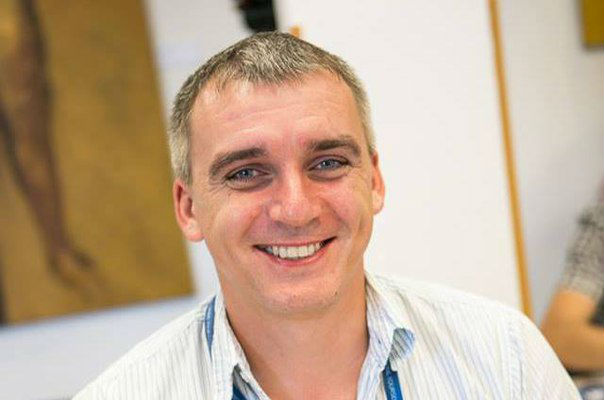 Built on a series of spits and peninsulas, the Ukrainian city of Mykolayiv feels surrounded by water. It is here that in 1789, Russian Prince Gregory Potemkin built the shipyards that would repair Russian Empire ships fighting the Ottoman Empire, shipyards that remained of such importance that the city was closed to foreigners for most of the Soviet period.
Built on a series of spits and peninsulas, the Ukrainian city of Mykolayiv feels surrounded by water. It is here that in 1789, Russian Prince Gregory Potemkin built the shipyards that would repair Russian Empire ships fighting the Ottoman Empire, shipyards that remained of such importance that the city was closed to foreigners for most of the Soviet period.
City politics had never been terribly active or competitive. Local bosses controlled the electoral process and citizens were often in the position of choosing between two evils. In both the 2005 and 2010 elections, the city and the surrounding region voted for now-disgraced former President Viktor Yanukovych.
Given this political history, and with Russian the city’s most common language, when pro-Russian agitators popped up in cities along Ukraine’s old imperial coast in early 2014, many expected Mykolayiv to go the way of Donetsk and Luhansk and join separatist movements. Instead, Mykolayiv joined the hundreds of other Ukrainian cities that toppled their Vladimir Lenin statues.
Of course, the victories of the revolutionary Euromaidan movement have, in many locales, borne little fruit: many Ukrainian cities continue down the same sclerotic, corrupt path. But suddenly, Mykolayiv seems ripe for change.
The city’s mayoral elections this year were expected to go as they always had, with business interests and corrupt local oligarchs pouring as much money as necessary into electing their man. Most assumed the incumbent mayor, Yuriy Granaturov, would easily prevail in the first round of elections on October 25. But he was unexpectedly deposed in the first round by two men in their thirties.
In first place was 34-year old Igor Dyatlov, who took 36 percent of the vote. Dyatlov, the son of a well-known Mykolayiv businessman, had been a member of the regional parliament since age 25. Running under the banner of the Opposition Bloc (which is largely composed of politicians who once belonged to Yanukovych’s Party of Regions), his campaign was widely acknowledged to be funded by the oligarch Vadim Novinskiy.
Dyatlov’s inclusion in the top two was not much of a surprise, but Alexander Senkevich’s was. A 33-year old IT business owner, Senkevich unexpectedly eliminated the incumbent by earning only 408 votes more than Granaturov. It was the first time in Mykolayiv’s history that mayoral elections had progressed to a second round.
Perhaps inspired by the visible changes in neighboring Odesa, the self-proclaimed pro-Western and pro-European parties and activists quickly aligned themselves behind Senkevich. As a member of the young and dynamic Samopomich (Self-Reliance) Party, his survival into the second round signaled to many that Mykolayiv had a chance at good and effective leadership.
With origins in the western Ukrainian city of Lviv, Samopomich has made a name for itself by promising and delivering improved governance in the localities it runs. It was this record, the party’s youth, and its leader, the successful Lviv mayor Andriy Sadoviy, that made some, like Evgeniya Dulko, 26, gravitate towards Samopomich.
An active member of Mykolayiv’s cultural community, Dulko runs an NGO called ART Optimists, and was recruited to run for a council seat under the Samopomich banner. Like many Ukrainian young people, it was not Dulko’s “dream to take part in elections.” But, “when I was invited, I decided to try.” Although she lost, she and reportedly 1,600 volunteers from both inside and outside of Mykolayiv campaigned for Senkevich in the second round.
Given Dyatlov’s dubious financial support and high-profile but disliked backers, Senkevich chose to cast the second round not as “a fight between Senkevich and Dyatlov, not between volunteers and bandits, but a fight for [Mykolayiv] between good and evil.” The Senkevich camp made much of the fact that his campaign was run on a shoestring budget, with the help of volunteers, and without many of the resources that Dyatlov’s campaign had.
This grassroots style worked. Senkevich won a major victory, taking nearly 56 percent of the vote. Voter turnout was four percentage points higher than the city had seen just three weeks prior.
Dulko and the rest of Senkevich’s team of volunteers were understandably exultant. Dulko said this contest “was not a choice between two different personalities, it was a choice between a progressive, pro-European future for the city and a pro-Russian, ex-Party of Regions vision of [Mykolayiv].. . . We were lucky at least to have such a choice and it is great that we have made the right decision.”
But despite the campaign’s success, Senkevich will have a hard time making the changes that he and his supporters want. One Mykolayiv English professor, Olga Anikina-Lopakova, told me, “Many of the people who voted for Senkevich voted not for him, but against Dyatlov.” And that reality is reflected in the makeup of the newly-elected city council, where the Opposition Bloc holds nearly half the seats. For a pro-Senkevich coalition in the city council to work, he will need to unite three different political parties with their own internal factions, a daunting task.
Mayor Senkevich has promised to run the city in a transparent manner, putting all official documents online. He’s also pledged to transform Mykolayiv into a Ukrainian Hamburg, or a regional transportation and logistics hub, by taking advantage of its access to the sea and good transport links.
His fellow citizens, jaded by the promises of politicians past, are wary, but remain hopeful that two years after it began, the Euromaidan’s values are beginning to trickle down to the local level.
Hannah Thoburn is a research fellow at the Hudson Institute.
Image: Political newcomer Alexander Senkevich won the mayoral race in Mykolayiv, Ukraine, on November 15. Credit: Alexander Senkevich’s VK Page
